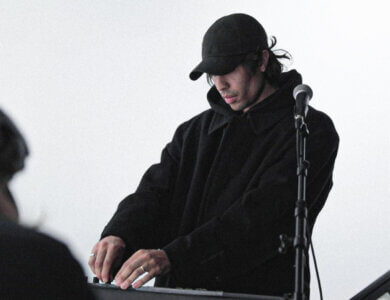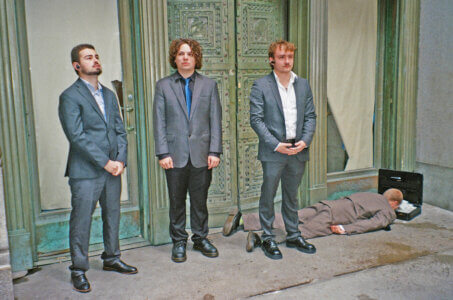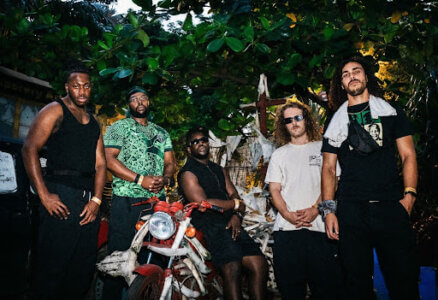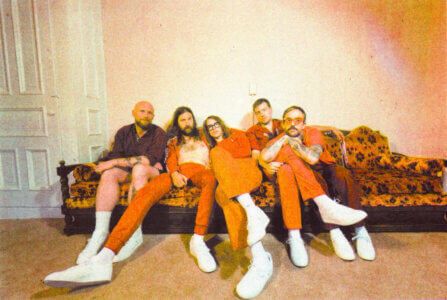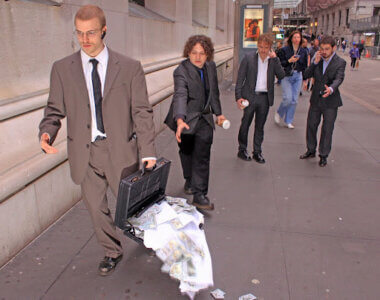Lip Critic Makes A Loud Introduction
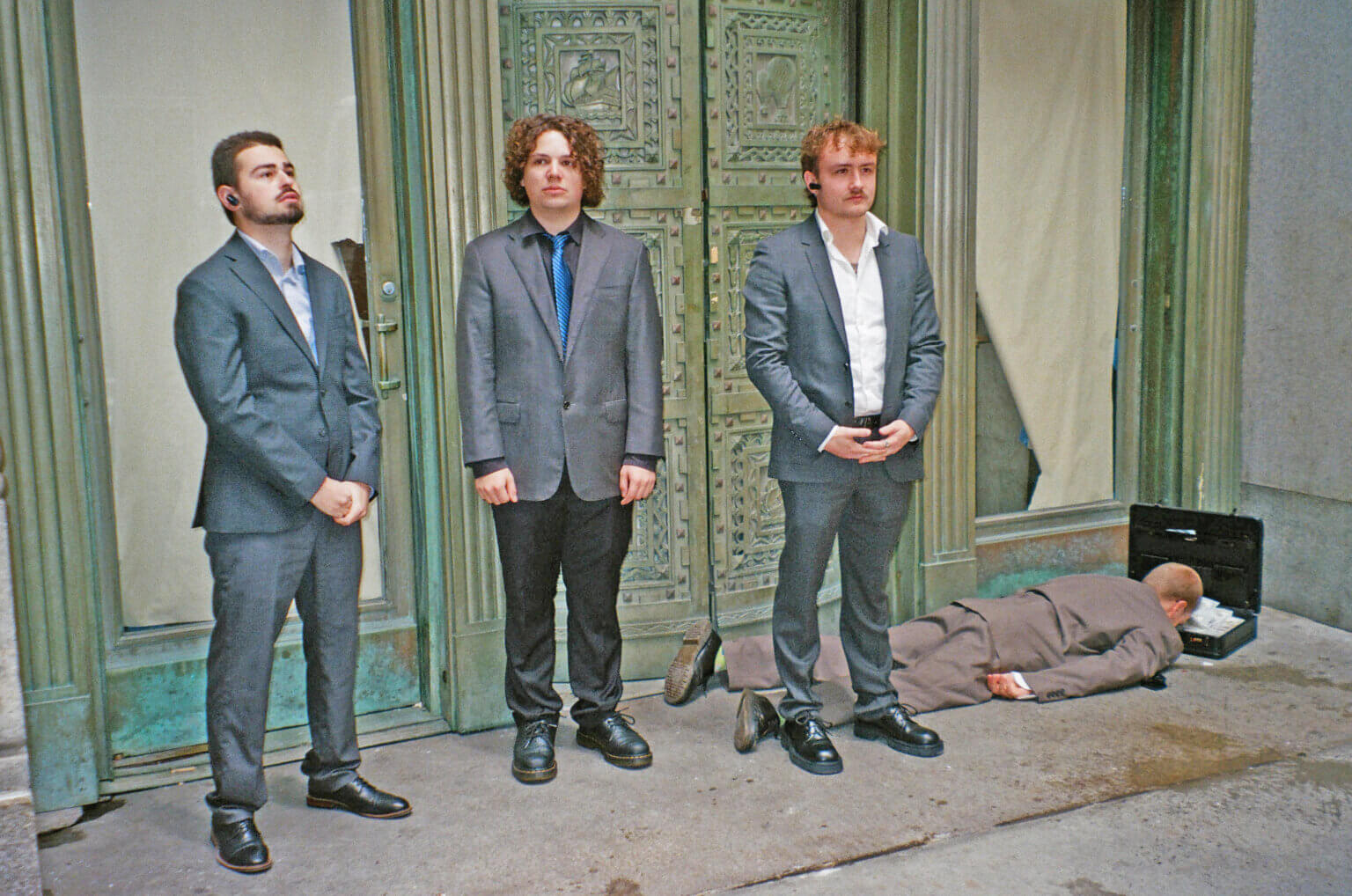
You never know what you’re going to hear or where you’ll end up on Hex Dealer, the exhilarating debut record from NYC-based electronic-punk quartet Lip Critic. One moment, vocalist Bret Kaser lures you into their world by revealing a disappointment in not acquiring a level of freedom that he’d anticipated from a pair of brand new jeans. A few songs later, that sense of security in everyday issues is overturned with harrowing (but intriguing) sound collages of wailing farm animals or mentions of human sacrifice which are accompanied by intensely claustrophobic and arresting arrangements. Hex Dealer is an extraordinarily visceral and complex record, one that announces Lip Critic as an act deserving of your time and attention.
Lip Critic vocalist Bret Kaser and one of the band’s drummers Danny Eberle – the line-up is completed by second drummer Ilan Natter and bassist Connor Kleitz – spoke to Northern Transmissions ahead of the release of their debut record released via Partisan (IDLES) on May 17th about their creative process, an intriguing item of Lip Critic merch that will set you back $1,000 and their approach to performing.
NT: There’s only a few weeks until Hex Dealer, your debut record on Partisan Records, comes out. How are you guys feeling?
Bret Kaser: Yes, super excited! It’s been done for so long and we’re very, very hyped to actually have it out and have people listening to it.
NT: What was the recording experience like because I was watching videos of your live shows and they’re so exhilarating and a bit chaotic. Those elements of your live sets translate really well into the record. I have to imagine it could be challenging to recreate that energy in the recording sessions because you don’t have a live audience in front of you to respond to in your performance. How was the recording process?
BK: Well, it was a very similar workflow to the other projects we’ve done where it was Connor [Kleitz] and I producing a lot of like small starts to tracks. Then, we would go to a studio and record drums over sort of like these loops, partial songs, and then we’d take all the drums back into our workstations. We’re remaking the songs then with the drums in mind so a lot of them would be entirely different from the initial things they recorded drums over. Lyrics would usually come last, once the song form is all together. They would be in the back of my head, thinking about where, you know, phrasing and different stuff would work. Even up until the last few mixes, stuff within songs is getting moved around because Ilan [Natter, one of Lip Critic’s drummers] and I mix the records as well.
Up to the last few revisions, we were still shuffling stuff around. It’s kind of like a giant Rube Goldberg machine where we’re like swapping parts of it out and trying different ways to make the thing work. It was really fun to do, I think it was probably the most focused vision in mind that we’ve ever had. We were really strict about what actually made the final project and we were hard on ourselves about trying to make everything really good. It was probably the most focused and serious thing, but also the most fun and adventurous body of work that we’ve done so far.
NT: With Hex Dealer being your debut record, and it coming out on Partisan who have been working with so many exciting artists and bands in the last while, was there a lot of pressure that you put on yourself because this is an opportunity to make a strong first impression with audiences and make them eager to see Lip Critic perform live?
Danny Eberle: Well, it’s very interesting because we had worked on this record almost two years or is it over two years ago now? I think it’s just about two years ago now when we started this record. At that time, we had no genuine plans at the time of putting this out on a label. I remember being upset that the record was coming out in 2023 and not 2022. Now, here we are in 2024 and it’s finally being released and now we’re with a label that can help us a lot and has a great roster and has a large following. I don’t know if there was necessarily any pressure on us while we were working on it. But now, it’s become this thing where we’re becoming a sort of buzz band and that sort of pressure will go into our future releases and how we approach them. Hopefully people that like Hex Dealer will also like our future releases.
BK: We didn’t know, though, that anything like this would ever happen for us. We were making this record with the anticipation of maybe self-releasing or releasing with a tape label. There was no conception that we would be on a label like Partisan or anything! So yeah, definitely at the time,, there was no pressure in making it, honestly, because we had no idea any of this was going to happen.
NT: I was on your Bandcamp page the other day and I saw that you already have loads of merch available; lots of T-shirts, a pair of jeans, as well. One thing I was really interested in, at the very end of the merch page, is the Kill Lip Critic cassette tape that’s for sale for $1,000.
BK: It’s just a luxury product! It’s for those that can afford it. No, it’s just a joke! We have one of them and I think the whole thing was that Connor didn’t want to remove it from the store. Or maybe he didn’t know how to remove it from the store or something, but he didn’t want anyone to buy it, either, so we set it to $1,000. I mean, I want to keep it up there forever because I love the idea that someone would see it and think that we believe in our heart of hearts that it deserves to be $1,000.
NT: You never know, you might have some celebrity fans out there and they’ll buy it! Back to Hex Dealer, you were saying that as you’re making the record, you’re changing lyrics and structures throughout the process. Listening to your music, there’s something so instinctual, especially in the drumming, that creates an immediacy in the work. In terms of the lyrical side of things, are they something that you ruminate on for a while before setting them down? Or do you sometimes go into recording sessions and see what comes out of you in the moment?
BK: I’m definitely always writing with a microphone on. A lot of the tracks will have parts that are improvised that I enjoy doing and I tend to build around the stuff that comes up naturally in those moments. I do pretty ferociously edit when it comes down to the final versions. I have a thing where I can’t let myself know that I’m trying to write a song or else it won’t happen. It has to be in this pre-association realm at the start and everything gets refined from there. But yeah, the lyrics are super codified. Throughout the whole record, it’s like being on a sort of National Treasure scavenger hunt!
NT: Interesting you say that because when I was listening to the record, I noticed a line that appears on the opening song “It’s The Magic” where a recording of a woman says, ‘My son and the mailman have been trying to kill me for months and the police have done nothing” which returns later on in “My Wife And The Goblin” where you repeat it. Where did that line come from? Is it from a movie?
BK: It’s our friend Kali, who’s a musician and friend of ours. I sent her a script of things to read and then recorded it and chopped it up throughout the whole record to try to portray a kind of live news interview or something like that. I always think about the YouTube videos that will go viral of people who have just been through an insanely traumatic event and then it’ll get meme’d because they say something funny accidentally. There’s so many of them that you see on American news stations, like somebody’s house could have burned down and they’re interviewed and suddenly there’s a meme about it and people online are like, ‘Look! It’s like my-house-burned-down-lady’. I was trying to draw from that aspect of virality culture and meme culture. But yeah, have it all scripted so it falls in line with our whole narrative.
NT: There’s an apparent likeness to the type of sonic darkness that Death Grips in Lip Critic’s sound. Lyrically too, there’s so much darkness in the album, but it’s also really invigorating. There are moments where you mention hell or death and then there’s the really intense and harsh sounds of farm animals at the start of “Milky Max”. There’s a savagery ingrained in the songs, can you tell me about that element of the record?
BK: Yeah, I think that thematically all four of us are interested in similar stuff. I think there’s an aspect of the songwriting that has always tilted towards themes that are a little gruesome or vaguely traumatic or horrifying but always are just like…
DE: Abstract like weird themes.
BK: Yeah, it’s like this idea of trying to process or write music about stuff that’s horrifying or unsettling. That’s just the way that the four of us communicate, which is entirely through jokes and humor. I don’t know how we would process anything or talk about anything without some levity. Musically, it’s kind of the same thing where we’re writing about stuff that’s interesting to us and engaging to us but we’re always going to put it through this lens of vaguely psychedelic or jokey sort of language. Absurdist stuff and nihilistic themes. I never really thought about it as being like a gruesome record, though. But we talked to someone at Lowlands, and they were like, ‘So, this is kind of like a body horror record’, and I had never really thought about it being like that. Looking at it again, it does sound like that. Which is interesting to see now.
NT: That also makes me think of your song “Sermon”, where there’s mentions of human sacrifice and even at the start of the song your vocal delivery sounds like you could be a cult leader. There’s a theatricality to the song.
BK: Yeah, there’s a theme throughout the whole record about this feeling of being piloted by something that is not yourself. Or, feeling like you’re not entirely in control of your own actions. Something is taking a hold of you, which is sort of a direct reference to the feeling of when you’re playing a live show or you’re at a really powerful live show. There’s this feeling that you lose your sense of caring about the future or the past, just caring about that moment. Being the best performer, being in that moment where, like… I would knock myself out trying to make one person in the crowd laugh. I don’t really care about the aftermath. But in my regular life, obviously, you live with all sorts of general responsibilities and care about yourself. But as soon as you get into the show, like in the context of a live show, Danny’s jumping on top of people and screaming his lungs out. But, when you talk to us outside of that or when we’re in our day to day lives, we’re just regular nerdy people. In the context of a live show, however, we’ll do anything for the laugh.
NT: What is the day of a live show like for you? Do you get kind of nervous? Do you have to get into a particular headspace?
DE: On the day of a show, I don’t think any of us particularly get nervous about a show. A lot of the time, we’ll be wondering if people are even going to show up! The amount of people in the crowd, or the amount of people that are invested in the show determines how deeply we put ourselves into the performance. If people are invested, if there’s 20 people in the crowd or less than 20 people in the crowd, and they’re really into it, sometimes that’s more fun than performing in front of a thousand people who aren’t necessarily into it.
It’s all about getting into the right headspace to put on the best performance. Physically, there’s a lot of stretching before the show. We all have a bit of a stretch routine! I’ll do some drum practice on soft surfaces to get my wrists going before a show, get the blood flowing. Bret will do different vocal warm-ups. So will I, in terms of being ready for some of the screaming stuff, I’ll try to get my voice ready for that, as well, so it’s not freshly shredded for the two seconds of the set that I sing in. It’s a lot of preparation. I don’t think any of us necessarily feel nervous, but there’s always kind of like, ‘Hmm, how’s this one going to go?’. We hope every show ends up with at least four people coming out of that show that are now into our band. That’s all we could really ask for and all we could really hope for with the show, to hope that at least one to five people are converted and want to come see us again. That’s what I think we want to do more than anything with a live show.
BK: Yeah, I think that’s something I’ve retained from Danny, is that idea that it doesn’t matter if there’s two people there or a thousand people. You give your all to the show, no matter what. It’s more about the ritual of performing and feeling that effort leave your body than like it is about a crowd response. It’s a selfish thing, it’s about improving yourself and knowing that you gave as much as you could to make it good.
DE: Yeah, absolutely. I think that even goes for before and after a show, in the actual social aspect of performing shows where you’re meeting new people, people discovering your band. I think it’s always good before the shows, if there’s an opening act or if you are opening for another band, to get to know the other bands and get to know the people in the crowd that seem interested in your band. Same goes for after a show where, even though it’s exhausting because you’ve just finished the show, it’s always good to stick around after your set and meet the people who have, in some way, been touched by your music. Even on the other hand, it’s funny seeing people that completely hated what they saw. That’s also an interesting thing.
BK: It’s rewarding in its own way!
DE: Exactly! It’s rewarding. It’s happened before where someone’s come up to me after a set and been like, ‘Yeah, that was… that was interesting!’. You immediately know that it’s not necessarily meant in a positive way, but I like that. It’s good to see that. We’re quite a polarizing band to some people, I feel. It’s great to see that in the case of a positive thing how somebody can be incredibly moved by our band, but also it’s equally great to see somebody that was wildly disturbed by what we were doing.
NT: You played some of your first shows in the UK and in Europe. Did you notice a big difference across the crowds in different cities compared to New York crowds?
DE: It’s interesting, honestly. I feel from our first Europe and UK tour compared to the shows we’ve played in New York, or the shows we’ve played in the US in general, it’s a bit of an older crowd. Yeah, in Europe and in the UK, it’s more of an older crowd than we’re used to. They’re very smiley and excited about what’s going on. I also feel like headlining shows in Europe and the UK have actually sold kind of better than some of the headline shows we’ve done in the US. That’s very interesting to me. I think that has to do a lot with the way that the UK and European press differs from U.S. press. I think U.S. press takes a little bit longer for a band to get talked about or get a reaction out of people. Whereas, I think in Europe and the UK, the press means a little bit more and that’s good because it brought people to the shows. As I said, it’s a bit of an older crowd, but people that came to the shows were very, very enthusiastic. While in the US, it’s kind of a mixed bag, you can play to people that are having the best time of their lives, and once again it could be like a tiny crow. We played to like eight people in Pittsburgh and we all had a great time at that show compared to playing a show in another part of the U.S. to almost noone and it seems like no one is into it.
NT: Finally, what are you most looking forward to with Hex Dealer’s release? What are you most interested to see from the response?
BK: I’m just really excited for people to hear the record in full. Even though there’s four out of the twelve tracks out, there’s eight songs remaining that hold a lot of surprises. It’s not a record where I feel that because we have four tracks out, that’s a good gauge of the overall flavor of the whole record. There are tracks that I’m really excited for people to hear like “Death Lurking” and “My Wife and The Goblin” and “Sermon”. Some of those tracks have been in our live rotation already for the better part of a year-and-a- half. I’m just really excited for people to hear it in full because it’s a record that we definitely were intending to be listened to all the way through, from start to finish. I’m pretty sure most people would say that, but I just think it’s a very fun record to listen to all the way through given the twists and turns and the Easter eggs.
DE: Yeah, I feel like with this record there’s just so much packed into 30 minutes, which I think is very important for a punk or alternative record to be very in your face. With the four singles that we’ve released, there’s a lot of variety in those already. It’s been cool to see the way that people prefer some songs over other ones and just see people’s reactions as we’ve released them. That’s been very cool. And I feel like no two tracks on the record are very alike. I’m excited to see how people react to that and the types of sounds that people are interested in. Also, I think we’re just very excited to tour this album. This is our first full release through Partisan and I’m excited for new people to come to the shows through that and for them to have a reference of what the songs sounds like recorded. We’ve been playing a lot of these songs for a while now, but it’s cool to now to have them in the set and see the ways people react to those songs at the shows.
Pre-order Hex Dealer by Lip Critic HERE
Latest Reviews
Tracks
Advertisement
Looking for something new to listen to?
Sign up to our all-new newsletter for top-notch reviews, news, videos and playlists.





